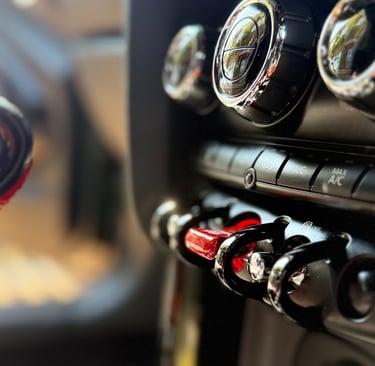Car wash vs Car detailing
Defining the Basics: What is a Car Wash?
7/19/20252 min read


1. Defining the Basics: What is a Car Wash?
A car wash is a surface-level cleaning process. It can be done manually or through automated tunnel systems, and its main goal is to remove loose dirt, dust, and surface grime. Depending on the method (touchless, brush-based, hand wash), it may also include:
Wheel rinse
Soap and rinse cycle
Basic wax or drying aid
Vacuuming (in some full-service washes)
Key benefits:
Fast (5–15 minutes)
Inexpensive (typically £5–£20)
Removes visible dirt
Limitations:
Does not address bonded contaminants
May cause micro-scratches or swirl marks
No protection applied to paint or trim
No interior deep cleaning
2. What is Car Detailing?
Car detailing is a deep-cleaning, restorative process that goes well beyond a standard wash. It focuses on the meticulous care of every part of your vehicle, including paint correction, protective coatings, wheel decontamination, interior cleaning, and more.
Car detailing services often include:
Pre-wash, two-bucket hand wash
Chemical decontamination (iron fallout, tar)
Clay bar treatment
Paint correction (polishing)
Ceramic coating or wax/sealant
Deep interior clean (steam or extraction)
Wheel and trim restoration
Key benefits:
Restores and protects paintwork
Prevents long-term wear from UV, salt, and pollutants
Maintains resale value and showroom condition
Customized to vehicle needs and owner expectations
Tradeoffs:
Takes several hours or even a full day
Cost varies widely (£80–£500+ depending on services)
Requires professional skill and products
3. Long-Term Value: Cost vs. Condition
From a financial perspective, car detailing provides better ROI for vehicle owners who care about long-term value. Regular detailing can help prevent:
Paint fading and oxidation
Corrosion in neglected areas (wheel arches, undercarriage)
Permanent stains inside the cabin
Leather cracking and trim degradation
In contrast, regular car washes may keep your car looking clean, but they don’t add protection or reverse wear. In some cases (like automatic brushes), they may even contribute to micro-damage.
Detailing adds value by:
Enhancing trade-in or resale appeal
Reducing future repair costs
Prolonging the life of paint and interior materials
4. Tradeoffs and Challenges in Choosing a Service
FactorCar WashCar DetailingCostLow (£5–£20)Moderate to high (£80–£500+)TimeQuick (5–15 min)Long (1–8 hours)Frequency NeededWeekly or biweeklyMonthly to quarterlySurface ProtectionMinimal to noneHigh-level (ceramic, wax, sealant)Interior CleanBasic vacuumDeep extraction, steam, and dressingPaint CorrectionNoneOptional but transformative
The biggest challenge is balancing cost and commitment. While car detailing offers superior protection and aesthetic results, it demands time, expertise, and investment. Car washes are fast and convenient, but may not justify the frequency or risk for high-value vehicles.
5. Making the Right Decision: When to Choose Detailing
Here are situations where car detailing is the smarter option:
You plan to keep the car long-term
You're preparing for resale or trade-in
The paint shows signs of wear: dullness, water spots, swirl marks
You drive in harsh environments (salt, grime, pollution)
You care about interior hygiene or own pets/kids
Car washes, on the other hand, are suitable for quick refreshes or budget-conscious owners who aren’t concerned with long-term cosmetic preservation.
6. Environmental and Ethical Considerations
Another aspect worth considering is the environmental impact. Professional detailing services often use water-saving techniques, eco-friendly products, and waste management protocols. In contrast, automated car washes may use harsh chemicals and consume excessive water.
From an ethical perspective, detailing services tend to support skilled labor and craftsmanship over mass, impersonal machinery.
Conclusion: Pay More, Protect More
Car washes and car detailing serve different purposes. One is maintenance; the other is preservation. While car washes are great for convenience, car detailing is the proactive choice for those who want to protect their investment, extend their vehicle’s lifespan, and maintain top-tier presentation.
In the long run, the extra cost of detailing pays dividends in resale value, aesthetic pride, and reduced wear-and-tear expenses.
